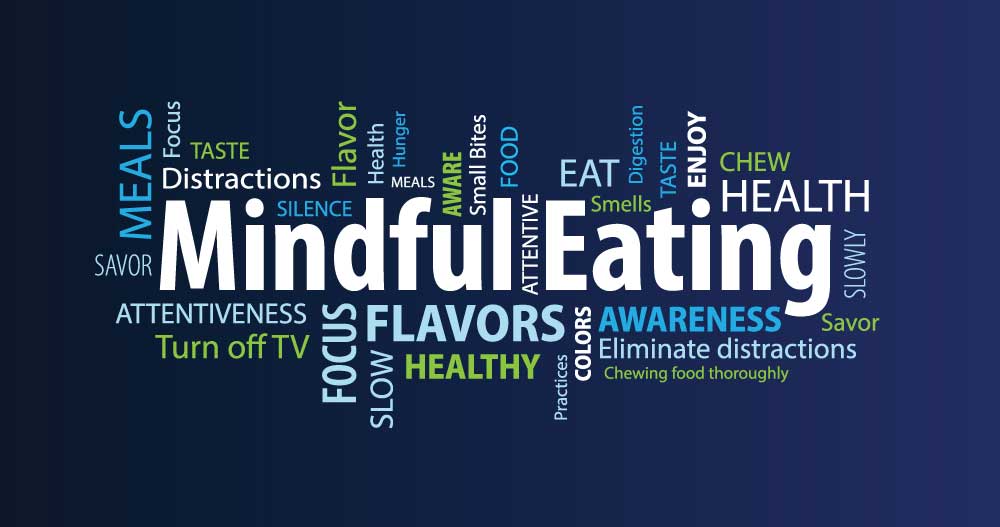Mindful eating should become a necessity regardless of the time available and our circumstances. This habit will not only lead to improved health and digestion but will also create a healthier relationship with eating. The concept of mindful eating first came to the forefront around the early 2000s as an extension of the mindfulness movement.
An article from the website Good Food Movement, says about mindful eating, ’It started being noticed by scientists and practitioners as beneficial in various ways, when practised correctly. There was growing research interest.’

What Is Mindful Eating?
Mindful eating is the habit of being fully present while eating and being aware of the food we eat. Ideally all the senses should be involved - taste, smell, sound, texture and sight - while consuming food. Rather than bingeing on an entire meal, or being distracted while eating, mindful eating focuses on choosing the right foods in the right quantity, eating slowly, and savouring flavours. It’s not just about what you eat, but also how you approach ‘eating’ as an act.
Food is not always eaten mindfully – whether it is overeating, emotional eating, binge eating or rushed meals between meetings in small intervals. This can be harmful in the long run, and we have to look beyond blaming our hectic lifestyles and instead prioritise our health.
All through history, eating habits or dietary restrictions have stemmed from various societal pressures to look a certain way, seeking unrealistic body standards. Mindful eating counters these behaviours by encouraging individuals to listen to their bodies and hunger patterns. This encourages a more compassionate and intuitive approach towards food consumption. However, developing a lifestyle wherein you mindfully eat, might take time to fully implement, especially if you have been neglecting your eating habits.
Key Principles Of Mindful Eating -

• Be present - When your food is in the front of you, prioritise everything else as far behind as possible, especially the phone and television. The focus should be solely on eating.
• Engage all your senses - Pay attention to the taste as well as the texture, colour and aromas of the food you are consuming.
• Eat slowly - Take smaller bites of your food and chew properly. This allows your body time to signal fullness.
• Listen to your body - When you are hungry or about to get full, the body sends out cues and you must pay attention to them.
• Appreciate your food - Practice the attitude of gratitude for what you have to eat, appreciate the entire cycle and the effort that has gone into the food being served on your plate.
• Create a mindful eating environment - Eat in an environment that is noise-free or free of any other distractions, so that the entire focus can be on the food.

Benefits Of Mindful Eating -
• Improved digestion - Consuming healthier options in the right quantity, and eating slowly will lead to thorough food digestion with essential nutrients being absorbed effectively by the body.
• Better weight management - Focus on the cues of fullness and hunger with mindful eating, This enables weight management because it will alarm the body every time you’re about to be over-fed.
• Reduction in stress and emotional eating - When you are present in the moment with the food that you are eating, your stress levels reduce and the urge to emotionally also decreases.
• Enhanced relationship with food - Mindful eating promotes a positive and enjoyable relationship with food.
• Increased awareness of your own body - Tuning in to your body’s signals at the minutest level can help increase your nutrition absorption.

Getting Started With Mindful Eating -
• Start with one meal - If you are a beginner, start with one meal a day, and then gradually start incorporating mindful eating during the other meals.
• Practice gratitude - Very importantly, reflect on all the essential nutrients that food provides you with. Be thankful to those who helped put it on your plate. Learn to appreciate every aspect of your food.
• Eat slowly - Focus on every bite, ensuring it has been chewed well enough for proper digestion.
• Involve all your sense organs - As you eat, all your five senses should be completely focused on each bite and meal.
• Eat in a distraction-free atmosphere - Consider food consumption as a sacred act, and find a place where you can eat peacefully, enjoying every bite of the food that’s served.
• Listen to your body - Start paying attention to what your body is saying when it comes to food, which will lead you to realisations about your eating patterns.